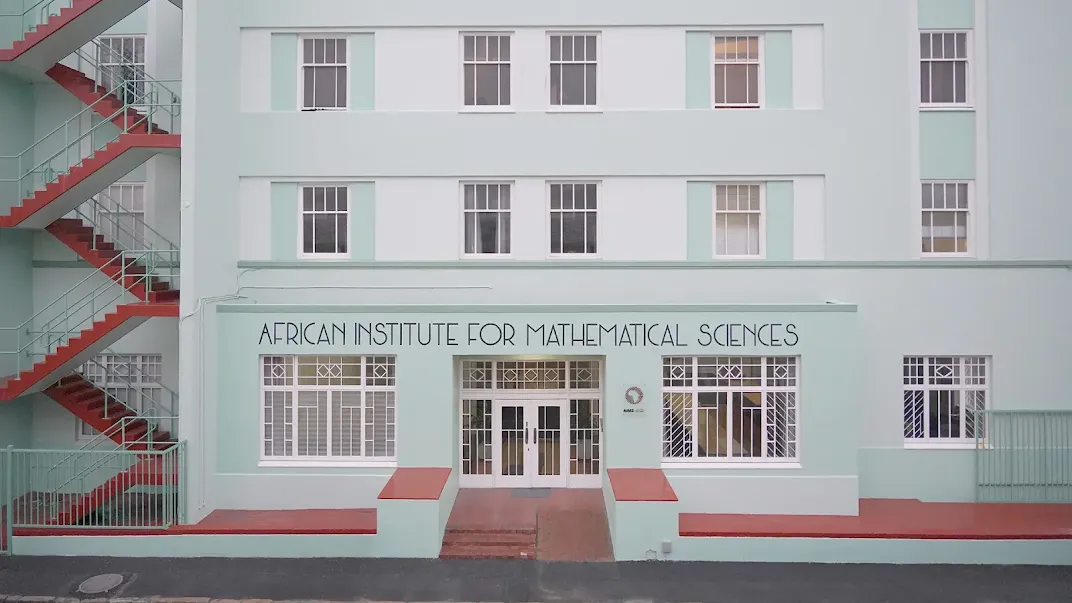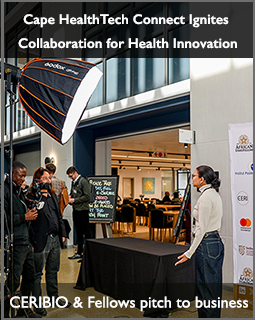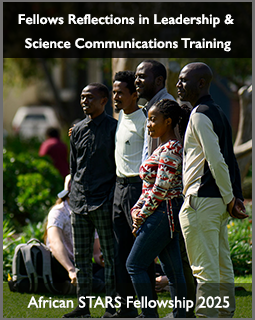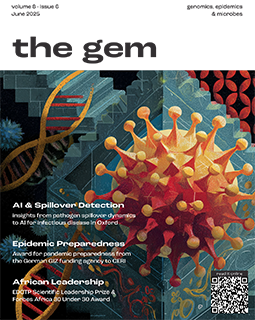CERI & KRISP expands partnership with AIMS & Google DeepMind

Food security, healthcare and exploring the cosmos are among the ways students of a new pan-African Master’s program aspire to apply AI
At Google DeepMind, we’re committed to supporting the next generation of artificial intelligence (AI) leaders to help build a stronger, more diverse and inclusive global AI community. This includes increasing access to AI and science through education.
Last year, we partnered with the African Institute for Mathematical Sciences (AIMS), Africa’s first network of centers of excellence in mathematical sciences, to launch an AI for Science Master’s program, with a $4.5M grant from Google DeepMind.
With such stellar scientific neighbours, the program benefits from the expertise of the Square Kilometre Array Observatory (SKAO) and its South African partner, the South African Radio Astronomy Observatory (SARAO), the Centre for Epidemic Response and Innovation (CERI), and the South African Centre for Epidemiological Modelling and Analysis (SACEMA).
This funding helps AIMS provide full scholarships, equipment and compute to talented local students, giving them access to advanced studies in mathematics, AI and machine learning from world-class academics at AIMS South Africa. Students have the opportunity to accelerate scientific discovery, with mentoring and support from Google DeepMind’s researchers and engineers.
This summer, the first cohort of students graduated at a ceremony at the AIMS campus in Cape Town, South Africa. As the next generation of AI leaders in Africa, Béria Chingnabé Kalpélbé, Olivier Mahumawon Adjagba and Diffo Mboudjiho Annette Dariose shared their experiences in pioneering AI research and what they’re hoping to achieve with their work.
Béria: Innovating for better food security
Sustainability is a top priority for Béria, originally from Chad. 'I hope to develop solutions for sustainable agricultural development that will benefit both people and the planet by integrating principles of renewable energy, precision farming, and ecological preservation in my work,' he says.
'Beyond agriculture, AI offers significant potential to enhance the resilience of Africa’s natural environments,' Béria adds. 'By implementing AI-powered monitoring and decision-support systems, we can safeguard Africa’s precious green areas and biodiversity for future generations.'
Olivier: Pioneering virus transmission research through the lens of climate change
Olivier’s passion for applying mathematics to complex problems led him to AIMS South Africa: 'Throughout my academic journey, I’ve been fascinated by the power of mathematics, particularly in addressing real-world challenges through AI,' he says. 'A solid foundation in mathematical sciences is crucial for driving progress in areas such as healthcare, climate science and technology — and I’m eager to be at the forefront of these advancements.'

Originally from Benin, Olivier now looks to apply this approach to data from African countries to help understand the spread of dengue fever. 'Using advanced AI techniques, I hope to create more accurate prediction models to inform public health strategies and interventions, ultimately contributing to the control and prevention of this viral disease.'
Olivier researhc work is part of the Climate Amplified Diseases and Epidemics (CLIMADE), a global program that is led by CERI.
Discussing the personal impact of his scholarship, Olivier recounts, 'Without it, pursuing advanced studies at such a prestigious institution would have been financially unattainable for me. This support enabled me to fully immerse myself in AIMS’ rigorous academic environment, so I could engage deeply in coursework, collaborate with professors and peers, and contribute meaningfully to research projects.'
Producing the next generation of AI specialists in Africa to fight epidemics, climate change and explore the outer space
As a home for AI research, Stellenbosch University (SU) is one of only three universities across Africa with scholarships from Google DeepMind, a world leader in artificial intelligence (AI) research and its application in the real world.
SU is also a founding and degree-issuing partner of the African Institute for Mathematical Sciences, where the first cohort of students graduated from the new panAfrican master’s program, AI for Science. Of 16 students that graduated, 11 graduated from SU. The Centre for Epidemic Response and Innovation (CERI) at SU were the focal point for five of the students, exposing them to advanced genomics, epidemiological and climate change large datasets to track and predict epidemics and pandemics.
'This first cohort of AI students in Africa were phenomenal, they have been trained by the top experts in the world and applied their knowledge to some of the biggest global challenges, like climate change and epidemics' commented Prof Tulio de Oliveira, director of CERI at SU. 'One of the challenges that we put to the students was how to use AI to better detect and predict where and how new variants of pathogens will emerge, so we can make Africa and the world safer' Prof de Oliveira team detected the Omicron variant and now use AI to predict and track new pathogens.
Google DeepMind features three of our SU graduates in a blog this week as they brought cutting-edge.
AI to scientific challenges in food security, health care, and outer space. Featured in this Google DeepMind blog post are Béria Chingnabé Kalpélbé from Chad, Olivier Mahumawon Adjagba from Benin, who worked at CERI tracking pathogens, and Diffo Mboudjiho Annette Dariose from Cameroon.
The university became the first African university to be awarded scholarships from Google DeepMind for postgraduate students in STEM in 2020. From 2022, SU’s Department of Applied Mathematics offers a structured MSc in Machine Learning and AI with further scholarships from Google DeepMind. In the Faculty of Engineering, Leanne Nortje is supported by a Google DeepMind PhD scholarship under the guidance of Prof Herman Kamper, working on AI specifically for local languages.
More information on the The AI for Science Master’s program at AIMS South Africa
AI for Science is a stream in AIMS South Africa’s Master’s degree in Mathematical Science, made possible through a partnership with Google DeepMind. The program sits at the exciting intersection of AI and the Sciences. This exciting program started with its first intake of students in September 2023. It is a fully residential one-year taught masters with a research component. Applications are open to students from across Africa who are passionate about mathematics, artificial intelligence and machine learning. We are looking for students who gaze at the stars and the world around them in wonder, and who want to use their talents to accelerate scientific discovery.
A Google DeepMind donation funds 40 scholars per year for the four years starting September 2023. The funding covers full scholarships, equipment and computation costs for students. Our scholars are Google DeepMind scholars, and have opportunities to connect with Google DeepMind’s researchers and engineers for mentoring and support.
Beyond scholarships, the program will draw on Google DeepMind’s world-leading expertise in AI for Science. It is an exciting time for science in Africa. On our doorstep, the Square Kilometre Array will be the largest radio telescope ever built and will produce science that changes our understanding of the universe. The first detection of the Beta and Omicron Covid-19 variants happened close to our institute in Muizenberg.
This news piece was published in the gem, Aug/Sep 2024

Click on the image above to read the gem, genomics, epidemics & microbes or scan the qrcode.
News date: 2024-09-01
Links:
https://issuu.com/the.gem/docs/2ndedition_the_gem_newsletter










